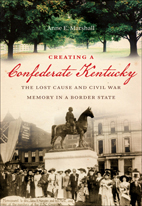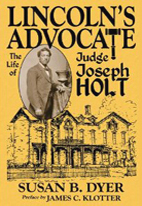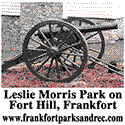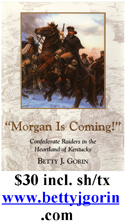|
Book Reviews
How, why Kentucky went Confederate
“Creating a Confederate Kentucky: The Lost Cause and Civil War Memory in a Border State,” by Anne E. Marshall, 188 pages of text, 20 pages of notes, plus a bibliography and an index, The University of North Carolina Press, 2010, $35.
Reviewed by
Dr. Paul D. Rominger
Bugle Staff Writer
(EDITOR’S NOTE: Dr. Anne E. Marshall is assistant professor of history at Mississippi State University. She received her bachelor’s degree in history from Centre College where she was Phi Beta Kappa, cum laude.)
Kenneth Noe refers to "this much-anticipated volume ... (as) a definitive answer to why ... white Kentuckians manufactured a false Confederate past..." And the state historian of Kentucky, James C. Klotter, calls this "A fresh, readable, insightful look at postwar memory."
The author writes, "I have utilized a body of evidence that historians of Kentucky have yet to apply to this subject. In addition to traditional sources such as manuscript collections, diaries, memoirs, and newspaper accounts, I have used travel accounts, fiction, and songs and periodicals both from and about Kentucky. Other evidence includes public celebrations such as parades, monument construction, veterans' meetings and other memorial and organizational activities."
Two attitudes helped define Kentucky as a Confederate state after the Civil War, one racial and one geographical. Marshall writes that as African Americans successfully appropriated the Union war victory to further their political goals, mainstream whites who sided with the Union during the war found it difficult to honor that past. Marshall also notes that Appalachian Kentucky acquired the reputation of having been exclusively Union.
As people like William Frost promoted Kentucky mountain people as the vanguard of Unionism and the hope of the New South, other persons used the divided loyalties of the mountains to explain the regional brutality that was rampant.
"The perceived normality of the Confederate portion of Kentucky – an area capable of peaceful reunion – exacerbated Appalachian Kentucky's growing lawless reputation. Moreover, this perception that made Unionism seem an anomaly not only legitimized the state's Confederate identity but made it look like the preferable, more civilized one."
It is hoped that a future edition of Confederate Kentucky will correct the statement that John G. Fee was a Methodist minister. In his autobiography, he states that he resigned as a Presbyterian minister from the Synod of Kentucky. He was invited to join the Wesleyan Methodists, but said that he wanted to be a part of an association that simply called itself Christian, with its congregations termed churches of Christ.
In Berea, he began the Church of Christ, Union, now simply called Union Church, and the Second Church of Christ, now called First Christian Church. He was part of the Alexander Campbell movement.
Later references to Fee, Cassius Clay and Berea College are excellent and accurate.
Marshall notes that Berea College served as the location of James C. West Post of the Grant Army of the Public and its Ladies Auxiliary chapter also formed in Berea.
With post and auxiliary help, Berea College hosted for many years Memorial Day celebrations and Fourth of July picnics "which had broad participation by Berea students and drew large crowds from the region."
This reviewer's mother remembers attending these events with her parents, sisters and brothers. Her mother spent several days preparing food for each picnic. These programs were enjoyable activities on the Berea College campus.
"Confederate Kentucky" is an interesting, informative book. It helps clarify the experiences of many of us who grew up in Kentucky and, in my case, in Berea.
Anne Marshall says this project began 10 years before publication. A major theme of this book is the malleability of historical memory and its change over time. In Confederate Kentucky, Marshall has successfully pursued this theme with detailed research and focused writing.
The book has set a new standard.
**********
She saves a reputation, plus a mansion
“Lincoln’s Advocate, The Life of Judge Joseph Holt,” by Susan B. Dyer, 251 pages, Acclaim Press, 2009, $24.95.
Reviewed by
Ed Ford
Bugle Editor
(EDITOR’S NOTE: Susan B. Dyer is a former Language Arts teacher who lives in Breckinridge County. She has a bachelor’s and master’s degree from Western Kentucky University and holds a Rank I in Education.)
It’s seldom that an author has accomplished so much.
Susan Dyer has changed the image of Judge Joseph Holt and, in the process, also has saved his historic mansion in Breckinridge County.
In her biography of America’s first Judge Advocate General, Dyer has unearthed a treasure trove of information about a native Kentuckian who has been much maligned in his handling of the prosecution of President Abraham Lincoln’s assassins.
The native of Breckinridge County supposedly failed to inform President Andrew Johnson that some trial commissioners had called for leniency in the death sentence handed down for conspirator Mary Surratt. Johnson signed her death warrant and Holt spent his remaining years defending his methods of dispensing decisive judgment.
Joseph Holt
 |
Although five members of the conspiracy trial commission signed a recommendation for a lighter sentence for Surratt, Johnson – through friends and others – charged that Holt had withheld from him the petition for Surratt’s clemency. As a result, Johnson allegedly had signed the death warrant without knowledge of the petition.
Dyer points out that after eight years of humiliation, Holt finally was vindicated of the President’s accusations by Gen. R.D. Mussey, Johnson’s confidential secretary.
The author, who spent 12 years researching her subject, paints a portrait of a just and honorable man who had a long career in the national spotlight and was a renowned lawyer and orator in Kentucky and Mississippi.
Holt served as Secretary of War under President James Buchanan and, after returning to Kentucky when Lincoln was inaugurated, was named the initial U.S. judge advocate general in September 1862. Prior to that, he was highly respected as a superlative Commissioner of Patents and Postmaster General during the Buchanan administration.
After joining the Union Army as a colonel, Holt was promoted to major general when he accepted his 1862 appointment. As such, he also became the first judge advocate general to hold general’s rank.
Dyer’s account of the history and heritage of a long-overlooked, but prominent Kentuckian, has changed and will continue to change attitudes about a man who stood for that which is right.
Ironically, Dyer’s book and her efforts to save the Holt House began when she drove by the Breckinridge County mansion that was quickly falling to ruin. She explained that the house seemed to call out to her and she began her journey of tireless research that led to publication of the book and her gargantuan efforts to save and restore Holt’s boyhood home.
The original portion of the house was built in the 1850s and the structure is now listed in the National Register of Historic Places and is noted for its significance in the areas of national history, politics and architecture.
Readers will be in awe of Dyer’s tenacity in tracking down the story of a worthy Kentuckian that history seemed to have forgotten. The only negative where “Lincoln’s Advocate” is concerned are the typos that appear early in the book. Despite that, this biography of Judge Joseph Holt is well worth a reader’s time.
I whole-heartedly recommend it.
|















